Spotlight
Into the Wilderness
Published
2 years agoon

By Michael Hines
This article was taken from a sermon Michael Hines preached at the 2023 National Convention of Open Bible Churches.
In 1678 John Bunyan published the first part of The Pilgrim’s Progress, an allegory of the Christian journey that Bunyan began writing while detained in a jail in England for holding church services. The Pilgrim’s Progress is considered one of the most important Christian books of all time. In more than 345 years, it has never been out of print.
Why? Because there is something about a long journey – the landscape you encounter, the fellow travelers you meet, the unexpected twists and turns in the road. It becomes a great leveler. That is why people take six months out of their lives to walk the Appalachian Way or undertake other incredible journeys.
This journey of our lives eventually evens us all out. We encounter different places along the way, the landscape of our pilgrimage, the places where we get stuck, places we miss altogether. All of them shape us. Nothing we accumulate along the way goes with us.
David speaks of it famously in Psalm 23 (ESV):
The Lord is my shepherd; I shall not want. He makes me lie down in green pastures. He leads me beside the still waters. He restores my soul. He leads me in paths of righteousness for his name’s sake.
We’re all here this week hoping for some of those still, restoring waters – the sense of the affirming hand of the Lord nudging us along paths of righteousness, preparing for us a table, allowing our cups to run over with goodness and mercy following us, pursuing us all the days of our life.
I want to address the journey of the past three years, which has been a great leveler for all of us, a time when many of us have longed for the green pastures and still waters of less troubled times.
We have all discovered that sooner or later the landscape of ministry changes, the terrain of our life gets more rugged, more barren. The climate gets more arid, the world more hostile because there’s no way to ascend the hill of the Lord without leaving the easy living of the coastal plain and climbing through the foothills of the Shfela, the Judean hills leading up from the Mediterranean coast to Jerusalem, passing green pastures and the gentle level plains going up into the olive and pine forested hills surrounding Jerusalem. We may think we have arrived, but the Lord continues to call us on because there is no way to pass from the slavery of Egypt into the place of God’s promise without crossing through the wilderness of the “rain shadow” desert.
The Spirit Leads Into the Wilderness
Throughout the Bible it seems the people of God are never far from the wilderness; it seems to be the place God chooses to meet us. Very few of us would choose to go into the desert for refreshment. But if you speak to the tourist guides in Israel, they will tell you that over time the wilderness becomes their favorite place. There one experiences stillness.
The desert fathers discovered this.
As the air becomes drier, God’s voice becomes clearer.
Every year the Feast of Trumpets, Rosh Hashana, signals the end of the long, barren, hot, dry summer months. It is a season of reflection and thanksgiving in preparation for the last and greatest feast of the year, Sukkot, the Feast of Tabernacles. It is during this season that the Jewish people take time to remember their forty-year wilderness journey and God’s provision and protection.
I have led you forty years in the wilderness. Your clothes have not worn out on you, and your sandals have not worn off your feet (Deuteronomy 29:5).
In the wilderness they experienced God’s constant presence teaching them His law, His ways – molding them into a people. He admonished them to recognize His sovereign hand of protection over them.
I don’t know about you, but there were times in this past forty months that the manna felt dry, and I felt like going back to Egypt. The ground was hard, the people angry, and it didn’t matter where you turned. To your congregation you were the Chief Medical Officer, Chief Compliance Officer, Chief Election Officer, and Minister of Racial Mediation. They wanted to know whether to mask or not to mask, whether to take their chances with an experimental manmade vaccine or an experimental manmade virus.
None of us chose this. But the first truth I want you to grasp is that sometimes the Lord leads us into the wilderness. Jesus was led there.
And Jesus, full of the Holy Spirit, returned from the Jordan and was led by the Spirit in the wilderness for forty days, being tempted by the devil. And he ate nothing during those days. And when they were ended, he was hungry (Luke 4:1-2).
Jesus’ first act after being filled with the Holy Spirit was to be led into a hard place, a dry place, a barren place.
David was driven to the wilderness.
O God, you are my God; earnestly I seek you; my soul thirsts for you; my flesh faints for you, as in a dry and weary land where there is no water (Psalm 63:1).
Elijah fled to the wilderness.
But he himself went a day’s journey into the wilderness and came and sat down under a broom tree. And he asked that he might die, saying, “It is enough; now, O Lord, take away my life, for I am no better than my fathers” (1 Kings 19:4).
Having just faced down King Ahab and the prophets of Baal on Mount Carmel, an act of incredible boldness, and having called the nation to repentance, Elijah now found himself running for his life from Queen Jezebel. The angel of the Lord came to him saying, “Arise and eat, for the journey is too great for you” (verse 7).
Today we see that same spirit of intimidation rising all around us, threatening us, isolating us, hounding us. Do you feel it? Has the journey become too hard for you?
The prophet Daniel saw it probably clearer than anyone in a terrifying vision of the end times, symbolized by a dreadful beast.
He shall speak words against the Most High, and shall wear out the saints of the Most High, and shall think to change the times and the law; and they shall be given into his hand for a time, times, and half a time (Daniel 7:25).
This was a different kind of kingdom – devouring, trampling, speaking words against the Most High, wearing out God’s people; that is, until the kingdom and dominion and power is given to the saints of the Most High. The revelation is told three times in three different ways, but it says the same thing. Trouble is coming. But those who know their God will do exploits, and they will overcome.
What does that mean? It is fixed. It is part of the unchangeable purpose of God. It is imminent. We are in these days.
Power is being consolidated; war is being readied against the saints of the Most High. Those who are not facing it directly are being worn out by a force and a power we don’t understand. Like Elijah, we are tempted to run, abandon our calling, give up.
The Spirit leads you into the wilderness to be tested, to experience the heat of refining, to walk into your calling, to prepare you for days that are yet to come, to learn how to worship. And it is amid wilderness that you find refreshment.
If the last forty months have felt like forty years, if you’ve been circling, wandering, without experiencing immediate fruit and you are not feeling God’s presence, know that it is in your desert place that He wants to speak with you, to draw away with you and remind you that your shoes have not worn out, the manna has not run dry. If you’d look up, you’d see rivers of living water flowing out of the rocks because the Spirit who leads you into the wilderness is able to sustain you there.
The Spirit Sustains Us in the Wilderness
The Spirit sustained Jesus supernaturally. He was “with the wild animals, and the angels were ministering to him” (Mark 1:13). The Spirit also sustains practically. He led the Israelites with a cloud by day and a pillar of fire by night. He provided manna for them and water from the rock. He sustains spiritually through the Word of God. At Mount Sinai, he had a message for the people:
And you shall remember the whole way that the Lord your God has led you these forty years in the wilderness, that he might humble you, testing you to know what was in your heart, whether you would keep his commandments or not. And he humbled you and let you hunger and fed you with manna, which you did not know, nor did your fathers know, that he might make you know that man does not live by bread alone, but man lives by every word that comes from the mouth of the Lord. Your clothing did not wear out on you and your foot did not swell these forty years (Deuteronomy 8:2-4).
The wilderness humbles you and tests you to know what is in your heart. It teaches you that man does not live by bread alone.
The “tabernacles” or “booths” used during the Feast of Tabernacles reminded the people of the tents they lived in in the desert. Made from flimsy branches of trees, the tents left the people fairly exposed to the elements. We all need this lesson on the character of God because we are prone to wander.
Trust comes from knowing God’s character. It was God who provided for the people in the wilderness. He was also able to provide in the land of promise. This teaches us to not limit Him.
God called out in Isaiah 55:1,
Come, everyone who thirsts, come to the waters; and he who has not money, come, buy and eat!” In the New Testament we find Jesus saying, “If anyone thirsts, let him come to me and drink” (John 7:37).
Jesus made this offer during the last day of the festival, after there had been little to no rain for six months. When you come out of a long, hard, barren summer season, the Feast of Tabernacles is a reminder that God is faithful. He who led the Israelites through the desert will lead you into His promises. Even though there are giants in the land to which He is leading you, do not limit Him. Do not withdraw from Him because of the giants in your life. Press in, rejoice. And out of your life will flow “rivers of living water” sustaining you and others.
The Lord will be seen in the wilderness.
The wilderness and the dry land shall be glad; the desert shall rejoice and blossom like the crocus. . . . . They shall see the glory of the Lord, the majesty of our God (Isaiah 35:1-2).
The Spirit Transforms Us In the Wilderness
And when Elijah heard it, he wrapped his face in his cloak and went out and stood at the entrance of the cave. And behold, there came a voice to him and said, “What are you doing here, Elijah?” (1 Kings 19:13).
God waits till we get to the end of ourselves and meets us by His Spirit. Elijah heard the still, small voice at Mount Horeb, a place of surrender. And the Lord changed him there.
When God transforms us in the wilderness, weak hands are strengthened, anxious hearts are calmed, blind eyes are opened, deaf ears are unstopped, and sorrow and sighing shall flee away (Isaiah 35:3-10). Jesus was filled with the Spirit at the Jordan (Luke 4:14), led by the Spirit into the wilderness, and returned to Galilee in the power of the Spirit (Luke 4:16-21).
For waters break forth in the wilderness, and streams in the desert; the burning sand shall become a pool, and the thirsty ground springs of water (Isaiah 35:6-7).
The wilderness gets hot. We get weary. We get tired. Let’s face it, the manna gets old. We get bored. We long for the next, new shiny promise, but we must wander a little longer because the Spirit has led us into the wilderness – sometimes forty days, sometimes forty months, sometimes forty years. It gets wearisome.
We believe God and trust Him for that land of promise ahead. But right now, we are in a dry place – led either by the Spirit, like Jesus, driven by circumstances, like David, or simply finding ourselves there in despair, like Elijah. Know that the Spirit who takes you to the wilderness will meet you there, transforming your heart, attuning your ear, and teaching you that man does not live by bread alone. You cannot learn it anywhere else.
Are you finding yourself in a wilderness season with little inspiration or direction in a dry and weary land with no water? Come to Jesus. He wants to refresh you with the kind of refreshment you can find only in His presence when your soul thirsts for Him.
Remember not the former things, nor consider the things of old. Behold, I am doing a new thing; now it springs forth, do you not perceive it? I will make a way in the wilderness and rivers in the desert (Isaiah 43:18-19).
About the Author
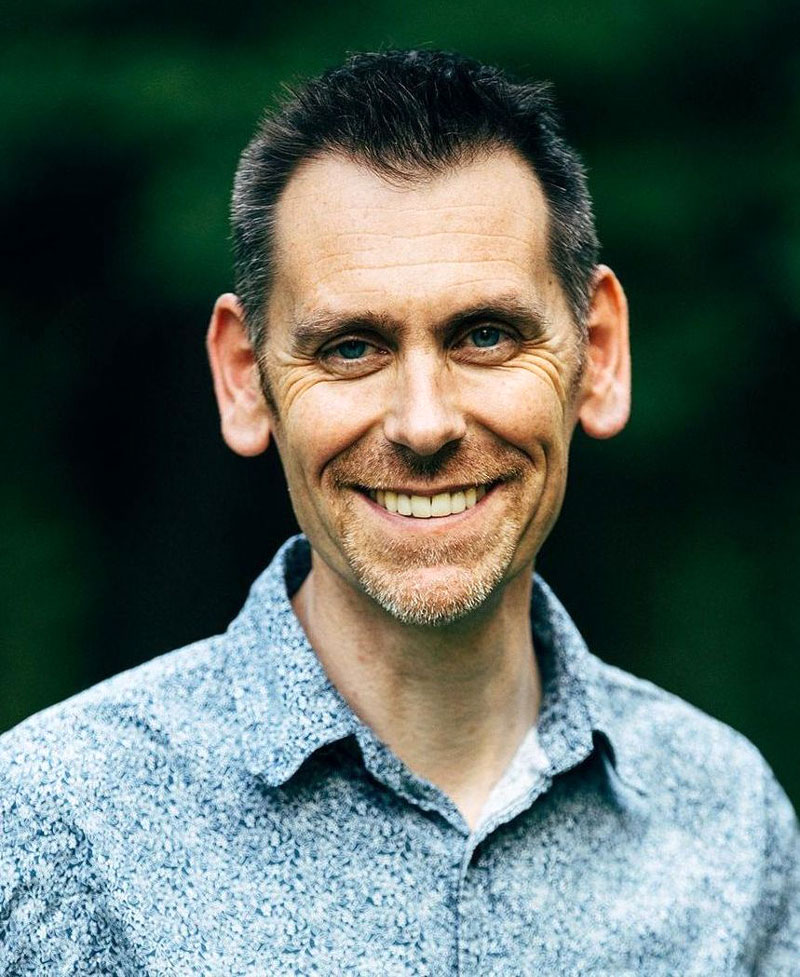
Originally from England, Michael Hines first answered the call to full-time ministry while on honeymoon in Jerusalem in 2002 – at a time when the city was being rocked by a relentless wave of suicide bombings and terrorist attacks. Sensing the call of God to stay in the Middle East, Michael and his new wife, Bonni, spent much of the next decade and a half serving with the International Christian Embassy Jerusalem, living for five years in Israel before relocating to the U.S. in 2007. After many years ministering in churches across the U.S. and leading numerous pastors’ trips to Israel, in 2018 they planted Foundations Church, an Open Bible church in Williamsburg, Virginia, that they still pastor. Their heart is to raise up leaders who can hear the voice of God, minister to the broken, and teach the Bible faithfully. Michael and Bonni have four children, each born in Jerusalem, and currently live in Williamsburg.
You may like

Spiritual direction…hmmm, sounds like what I get from the Holy Spirit when I pray, so why would I need to meet with a spiritual director when I can do this on my own? Seems unnecessary, right? Not to mention, I’m a guy; we never ask for directions.
That was my thinking a few years ago, until the day I got a call from another minister who was training to be a spiritual director. She needed to log a certain number of practice hours to finish her training, and she asked if I would be her “guinea pig.”
The call had “coincidentally” come in the middle of a challenging season; my pastoral duties felt relentless, and I was going through a profound life change. I felt empty inside as I wrestled with a nagging question: “Am I really hearing God clearly?” Unable to talk through my struggle with very many people, I had been feeling spiritually stuck. The person calling was someone I trusted, so I agreed to be a part of her training process. I thought I was helping her out, but little did I know this decision would stand as a cornerstone of my spiritual and mental health moving forward.
Spiritual direction is like having a wonderful (dare I say, sacred) friend who walks alongside you and gently guides you to notice and respond to the presence of God in your life.
Spiritual direction is like having a wonderful (dare I say, sacred) friend who walks alongside you and gently guides you to notice and respond to the presence of God in your life. Believe it or not, even the best of us can miss Him in the middle of our emotional and mental upheavals. Unlike traditional counseling or mentorship, spiritual direction focuses on deepening our relationship with God, helping us become more aware of His presence in our everyday experiences.
A Transformative Encounter: Experiencing the Father Three Ways
There’s one spiritual direction session that particularly stands out in my mind. My mom had just passed away, and my dad was in the final stages of his life. It had been a tough year of loss, and I was doing my best to keep it together. As I shared with my spiritual director, she made a suggestion. She said, “Gary, take the next ten minutes to sit before the Father and ask Him what He wants to say to you in this season.”
I muted the microphone, sat in silence, and stared out the window of my office into my backyard. It was a beautiful day, and the wind was rustling through the trees. Things moving by some unseen force. As I sat there, God reminded me of three snapshots (memories) with my dad. The first was a memory of being at the beach with him when I was four and his taking me into the deep water. I remember protesting that I didn’t want to go out there but also feeling safe because I was held tightly in my father’s arms. The second was a memory of when I was twenty and we took a trip together. It was on that trip that I felt my father, through his actions, take his mantle of authority and leadership and place it on my shoulders. The third snapshot wasn’t a true memory but a glimpse into the future. I was about to visit my dad in a month – it was to say goodbye as he was in the final stages of life on earth. My agenda was simple: I was just going to spend time with Dad.
In those pictures, with the wind blowing through the trees, the Father used my father to help me encounter Him. I’ll never forget the three things God whispered to me as I pondered those three snapshots:
Gary, I’m with you; you’re safe.
Gary, I’ve given you everything you need to fulfill what I’ve called you to do; I trust you.
Gary, all I desire is for you to spend time with me and enjoy my presence.
Those past and future joys were a reminder from my heavenly Father that I could take the path ahead because He was with me. I’m not sure I would have had such a profound experience had it not been for the preceding conversation with my spiritual director and our subsequent debrief.
Integrating Spiritual Direction into Pastoral Ministry
Moments in this and following sessions have been a game changer for me, helping me become a better leader and follower. I now approach decisions with a greater sense of grounding, choosing to rely on prayerful discernment and feedback from someone who’s spiritually mature and not emotionally tied to the situations. I’ve also learned to listen better, not just to God but also to people.
Spiritual direction has been a transformative experience for me, helping me grow both personally and professionally.
Spiritual direction has also been a huge help with my mental health. Regular sessions provide a sanctuary from the incessant demands of ministry and allow me to process those stressors in a safe context. I’ve learned to be more resilient, thanks to the reflective exploration of my spiritual journey, and I feel more balanced and purposeful.
If you’re a minister who hasn’t tried spiritual direction yet, I highly recommend it. Here are a few things to keep in mind:
- Find a spiritual director who’s trained to help others on their spiritual journey.
- Make sure you prioritize regular meetings. Consistent engagement allows for a deeper unfolding of your spiritual narrative and allows for sustained growth.
- Be open and vulnerable. Don’t be afraid to talk about the good and bad parts of your spiritual life.
Spiritual direction has been a transformative experience for me, helping me grow both personally and professionally. Remember, we all need help sometimes.
About the Author

Gary Kahn
Gary Khan was born on the island of Trinidad in the Caribbean. He moved to America when he was twenty to pursue his education and calling to be a pastor. He met his wife DeLaine at Eugene Bible College (now New Hope Christian College) and upon their graduation, they were married and began working at Desert Streams Church in Santa Clarita, CA. After thirty-two years as a pastor, Gary became an Executive Director of Operations for Marketplace Chaplains. He is the author of devotionals including Reset and Greater and his most recent book, That Didn’t Turn Out the Way I Thought.

On the fifth day of creation, our wonderful God showed himself in a brand new way. He began to create the living creatures that walk among us. This expression of His creation has shown itself throughout history; from Noah’s dove, to Balaam’s donkey, to Jonah’s whale and Daniel’s lions, God has continued to use animals in His grand plan and purpose.
We can still use these animals as a metaphor for God’s love and guidance. One notable example comes from Bob Sjogren’s book Cat and Dog Theology: “A dog says, ‘You pet me, you feed me, you shelter me, you love me, you must be God.’ A cat says, ‘You pet me, you feed me, you shelter me, you love me, I must be God.’”
As true as this may be, something wonderful happens when the molds break.
[God] certainly doesn’t want to drag us from one destination to the next. He would rather we follow Him willingly, eager to remain in His presence.
In our family, we recently experienced an interesting phenomenon when it came to our pets. To understand the story better, you need to understand our animals. Ralphie is our young, spirited Maltipoo. He has never met a stranger he didn’t love. He is sweet, loyal and in many ways the ideal companion.
Then we have our chihuahua, Sally. We found Sally roaming our neighborhood in 2014 with no tags and no microchip. She had obviously been mistreated, and when I took her to the vet, they found so many things wrong with her that I was advised, “Don’t be in a huge hurry to find her owner.”
We cleaned Sally up, and two weeks later she was legally ours. While she is affectionate to us and our kids, to this day, if I lift my hand to give her a pat on the head, she winces as if I am going to hit her (something I have never done and never intend to do).
Ralphie and Sally’s unique natures show themselves on our nightly walk around the neighborhood.
Ralphie tries his hardest to pull on the leash and run ahead. He so desperately wants to lead whoever is holding the leash that he nearly chokes himself on his collar. (We’ve had to switch to a harness.) He is unaware that he is only eight pounds, and his actions make little to no difference in the direction we are going.
Sally, however, must be practically dragged throughout the walk. She is timid and afraid to take a step that she isn’t sure is safe.
It’s quite a sight to have such different dogs reacting to the same thing.
Witnessing this phenomenon gave me pause, and I couldn’t help but think what a picture this is for the diverse ways we respond to the Holy Spirit’s leading in our lives.
So many people are like Ralphie. They try to tell God where they want to go without any regard to His guidance. They would rather choke themselves on their own will than listen to what He has to say. Others are like Sally and struggle to fully trust the Lord. For them to move, the Holy Spirit must practically drag them to the next place.
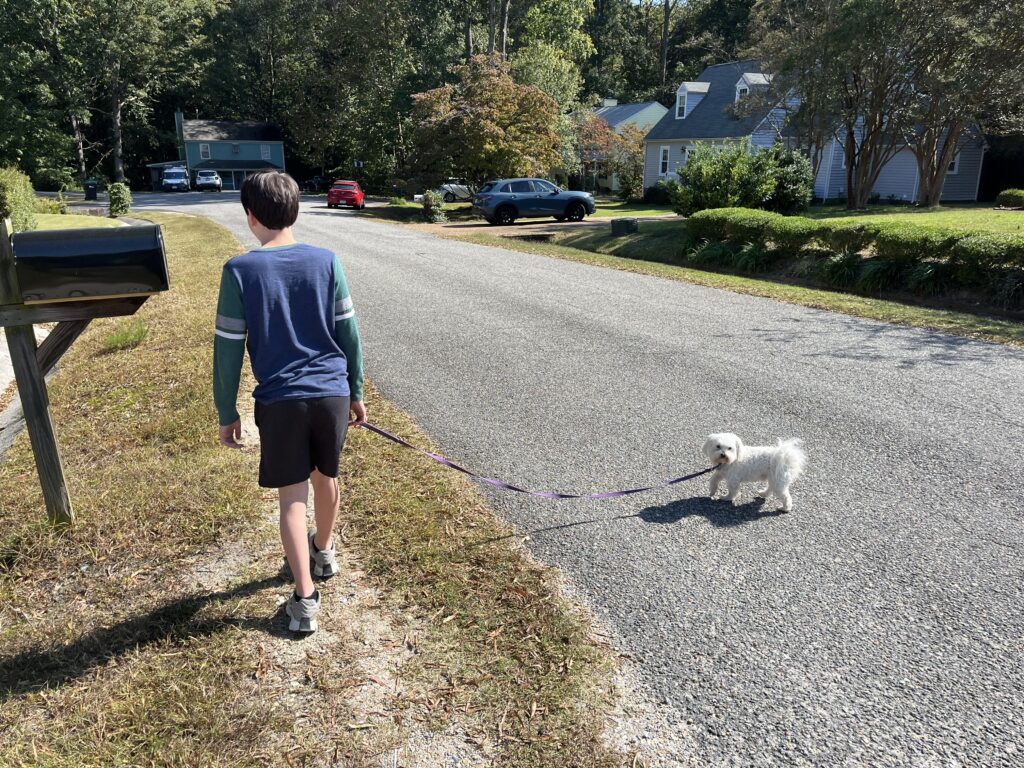
It sounds like a simple premise, but so many followers of God fall into these two opposite extremes. People miss their destinies when they act like Ralphie and Sally.
But there is another pet in our household whom I have not told you about. His name is Caesar, and he is an old, wise cat. We got Caesar the year we were married, and he lived up to his noble name every chance he got. Years ago, on our nightly walks with the dogs, Caesar began doing something amazing.
By his own free will, he would simply follow us on our walks. No need for a leash. No need for us to coax him. He just followed our gentle guidance every night for the mere purpose of being with us. Every now and then we would have to call his name, but he was always nearby.
I believe that in a world full of Ralphies and Sallys, God would rather we be like Caesar. The Lord doesn’t want us to tell Him where we are going rather than let Him lead, and He certainly doesn’t want to drag us from one destination to the next. He would rather we follow Him willingly, eager to remain in His presence.
In Matthew 8:18-22, two men express a desire to follow Jesus. The first is overly eager, not knowing what he is getting himself into. Jesus gives him a stern warning, explaining that he doesn’t know what he’s asking. The second man hesitates and says he needs to bury his father first. We never learn the fate of either man, but I hope they both abandoned their natural tendencies and learned to faithfully follow.
Whether you struggle with being too aggressive on your journey with God or whether you’re entirely too scared to take another step, I believe we can all grow in learning to be led
After sixteen years of being our cat, Caesar died peacefully this past March, but not before we had gotten a kitten named CJ. CJ is full of life and extremely playful. She was always so intrigued by our old friend Caesar that she started following him everywhere he went, even if it meant a walk around our neighborhood.
Caesar indirectly made a disciple with our young kitten, who now follows us on our walks every night. Despite how aggressive Ralphie wants to be or how timid Sally is, we now have CJ, just following along wherever we go.
Whether you struggle with being too aggressive on your journey with God or whether you’re entirely too scared to take another step, I believe we can all grow in learning to be led. If we will stay close to Jesus, we cannot help but fulfill His destiny for our lives.
About the Author
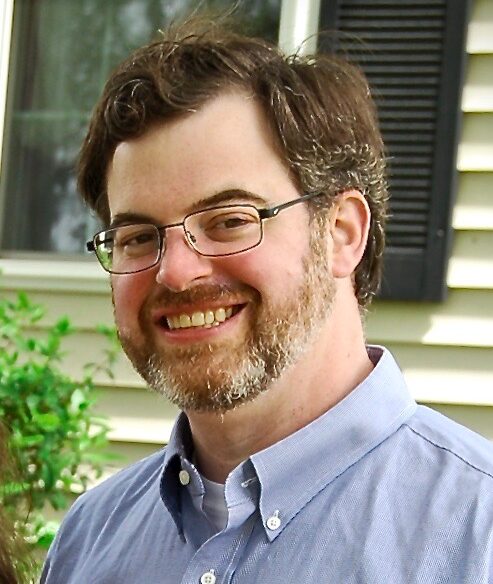
Bill Francavilla
Bill Francavilla is the lead pastor at Living Hope, an Open Bible church in Williamsburg, Virginia. Having lived in Virginia nearly his entire life, he attended Lynchburg College, where he studied history and theater. In 2017 Bill received his master’s degree in theological studies from Liberty University. He has been active in missions to Mexico, Dominican Republic, and Cuba. He and his wife, Jessica, have four children: Alex, Liam, Rita Grace, and Gino.

I am Shane Blackledge, and my wife Amber and I are the founding pastors of Cultivate Church in St. Louis, Missouri. My story is one of transformation and God’s grace, showing how He can use anyone to build His kingdom.
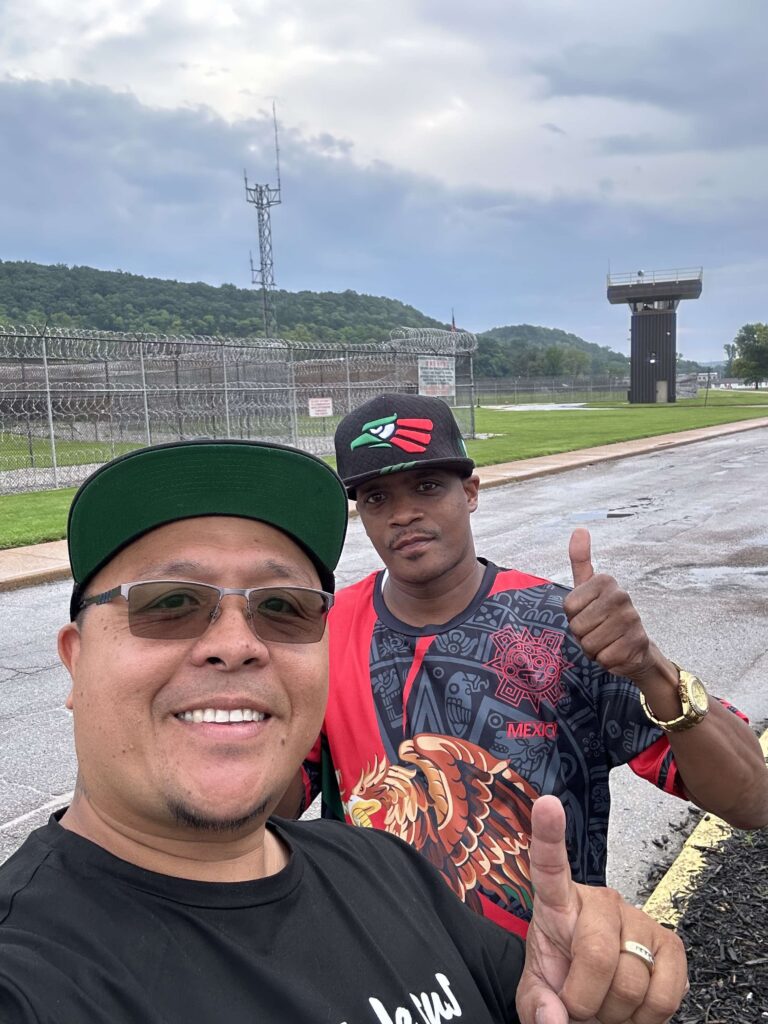
I was born in Colorado at the Air Force Academy Hospital. My father served in the Vietnam War, and while stationed in Taiwan, he met my mother and they got married. When I was six, my parents separated, and my mother moved back to Taiwan, leaving me devastated. As a kid, I faced racism and extreme poverty. I battled depression, anxiety, and thoughts of suicide. I started smoking and drinking at eight years old, joined a gang at age thirteen, and was using meth daily by the time I was fourteen.
At age seventeen, I was arrested and sentenced to thirty years in prison for selling drugs. I found myself in my jail cell wanting to end it all. On my night stand I found a Gideon Bible, and I opened it right to John 3:16. As I sat there reading, I realized I was a sinner, but that God created me and I had a purpose to live. I repented and asked Jesus to forgive me. I felt the Father’s love and the presence of the Holy Spirit in an indescribable way.
After my release, I struggled transitioning back into society (finding a job, paying rent, and finding a church that would accept me). I was discouraged and soon relapsed on meth. During the years of my addiction, I was sent to five prisons and was incarcerated for over six years. In 2006, after nearly dying from an overdose, I woke up from a coma and realized God had saved me from death. That day I fully surrendered to Christ, and that’s when my real transformation began.
In 2006, after nearly dying from an overdose, I woke up from a coma and realized God had saved me from death
God restored what addiction had taken from me. I have now been clean from meth for seventeen years. In 2013, I married Amber. We started attending Waverly Life Church, served as youth leaders, and eventually started a Celebrate Recovery program. In 2022, God called us to plant Cultivate Church in St. Louis, Missouri. We resigned from all ministries and jobs and sold our home. In April of 2023, we started house church gatherings which quickly grew in Christ and numbers. We launched our first Sunday gathering in October of 2023.
Today, we are a church without walls, modeled after the early church in Acts. We have regular church gatherings geared towards discipleship, street ministry, addiction recovery, Christian hip-hop events, prison ministry, and nursing home visits. We work with local treatment centers and recovery programs to support and mentor people. We have partnered with churches and ministries to organize monthly inner-city mission trips.
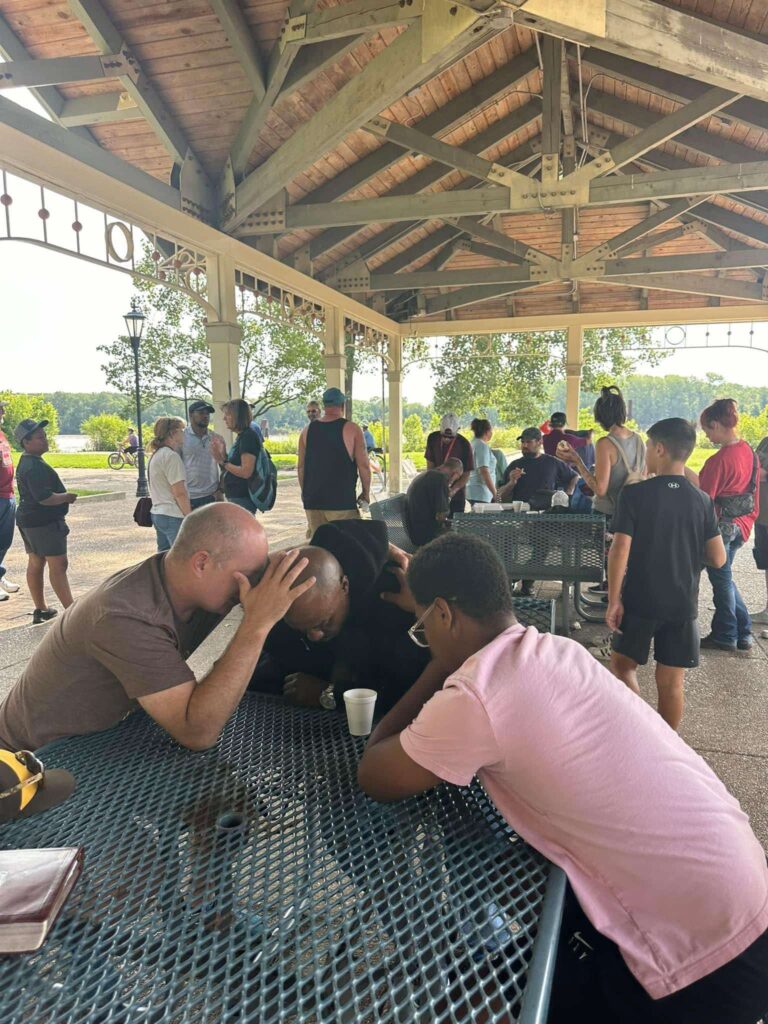
One way God has used my story is with my podcast: “Kingdom Minded,” which streams into 1000 prisons across the country on over one million inmate tablets. In partnership with the Edovo learning app, the podcast focuses on sharing testimonies and teaching Biblical principles.
Looking back, I am amazed at what God has done. In just a year our church has grown from a small group in our living room to a thriving community, passionate about sharing God’s love. Amber and I are excited about the future. We believe God is just getting started with Cultivate Church.
He can use anyone, even a former addict and convict like me, to build His kingdom.
My story and the story of Cultivate Church are really about God’s faithfulness. He can use anyone, even a former addict and convict like me, to build His kingdom. All the glory goes to Him.
To donate toward our prison ministry and homeless outreach, visit wearecultivatechurch.org or check out our Blessing Bags Gift Registry at HERE.
About the Author
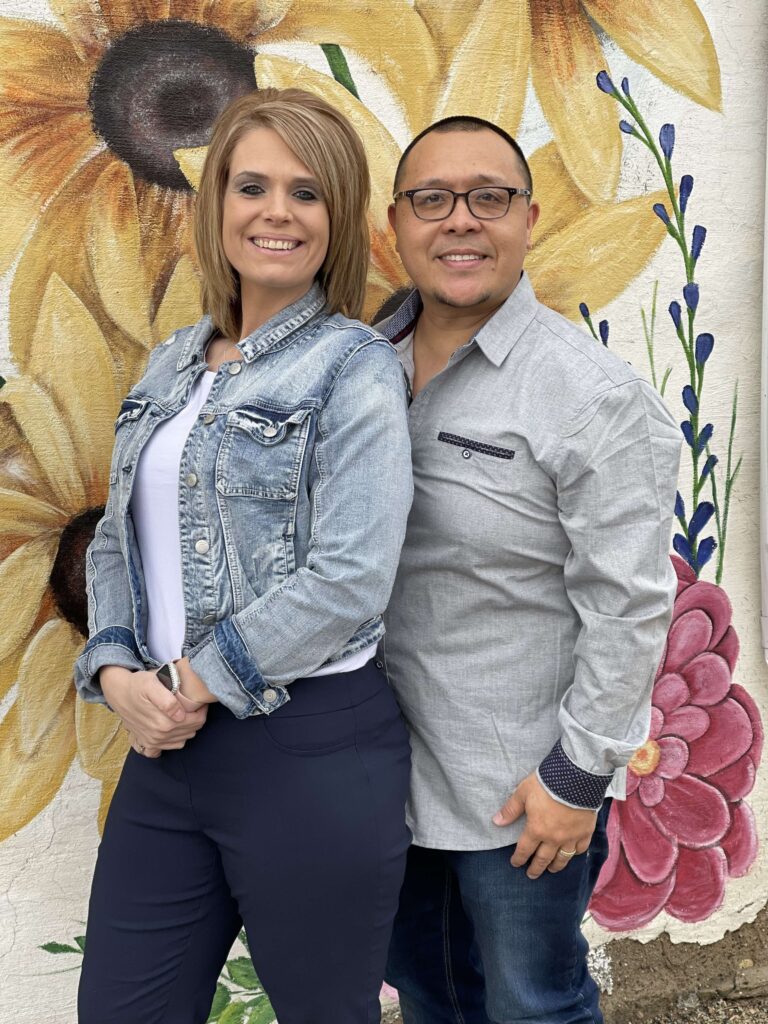
Shane R. Blackledge
Shane R. Blackledge is the co-founder and senior pastor of Cultivate Church. He and his wife Amber started Cultivate Church in their home in 2023. Today, the church is known for spreading the Gospel and being the church without walls. Shane’s podcast, “Kingdom Minded,” is available in over 1000 prisons on inmate tablets on the Edovo Learning App. Through testimonies and Bible principles, the podcast aims to teach, inspire, and equip Christians to live their best life now. Shane is an author and speaker, and his books From Prison to Purpose and Overcoming Codependency are available on Amazon. Shane and Amber have four children and live in St. Louis, Missouri.







